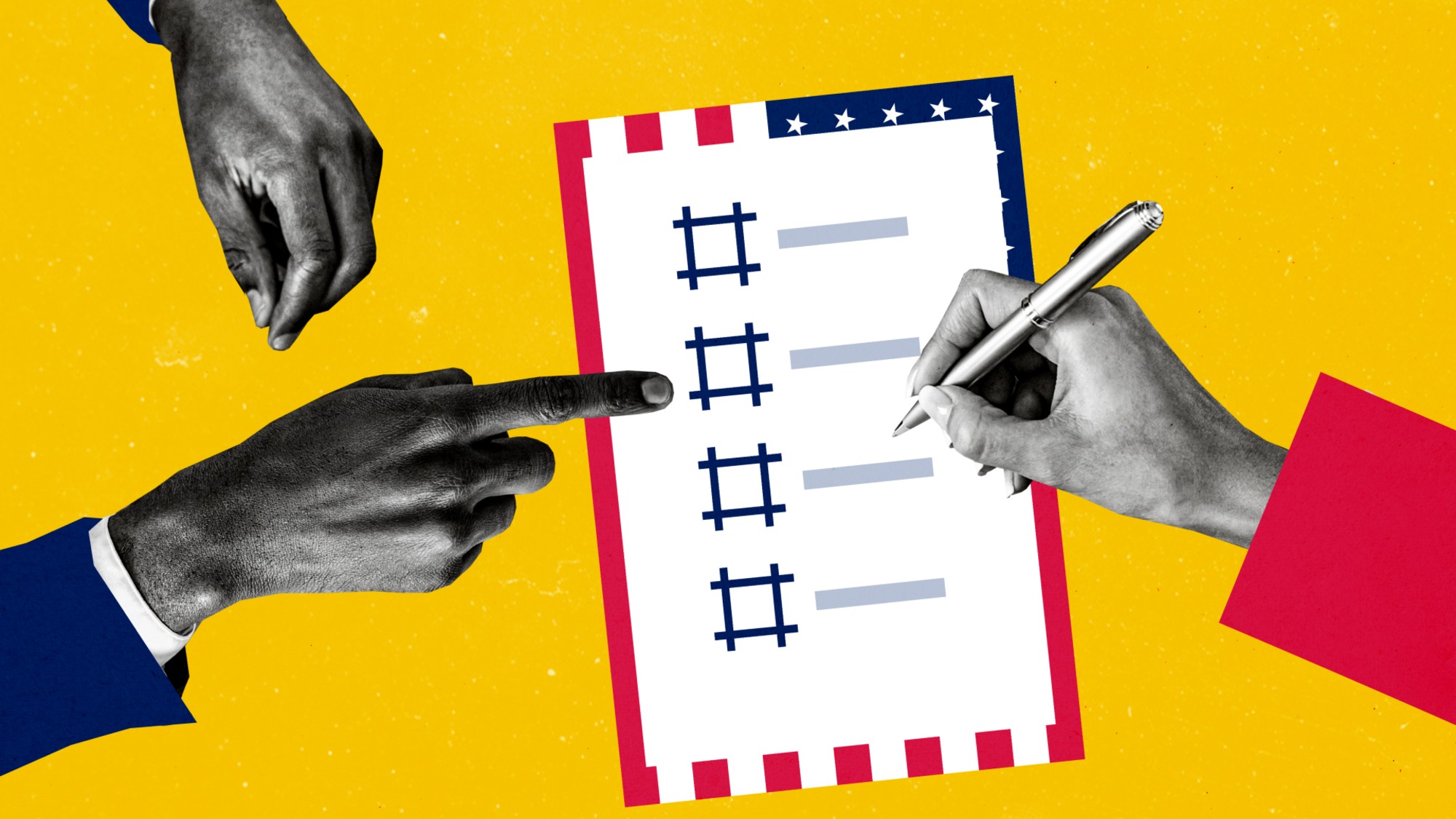Trump's federal return-to-office mandate descends into chaos
Was the administration unprepared, or was it a tactic to drive employees to quit?


A free daily email with the biggest news stories of the day – and the best features from TheWeek.com
You are now subscribed
Your newsletter sign-up was successful
At the start of the year, President Donald Trump signed an executive order mandating all federal workers end remote work and return to the office full-time. Since then, thousands of employees have been subjected to a rushed process that has evolved into an untenable working environment, pushing many to their limits. With the looming threat of layoffs led by the Department of Government Efficiency, many are speaking up anonymously about how chaotic the return-to-office mandate has been.
'Confusion, plummeting morale and more inefficiency'
Some early reports of the return-to-office mandate highlighted the "initial confusion and disarray" caused by "forcing tens of thousands of employees back to the office all at once," Wired said. Weeks later, "employees say the situation is getting worse." Despite claims that the mandate would lead to productivity increases and financial savings, employees say it has resulted in "widespread chaos, plummeting productivity, and significantly reduced services to the public."
The office has become "unpleasant, loud, people talk about whatever they want," and the "workload is insane with the mass layoffs and hiring freeze," an employee at the Department of Defense (DOD) said to Wired. "This is a terrible place to work," added the employee, who cries almost every day after leaving the office.
The Week
Escape your echo chamber. Get the facts behind the news, plus analysis from multiple perspectives.

Sign up for The Week's Free Newsletters
From our morning news briefing to a weekly Good News Newsletter, get the best of The Week delivered directly to your inbox.
From our morning news briefing to a weekly Good News Newsletter, get the best of The Week delivered directly to your inbox.
For some federal employees, returning to the office has "meant an expansion of their duties to include cleaning toilets and taking out the trash," said The New York Times. For others, it means "commuting to a federal building only to continue doing their work through videoconferencing." Many have been inundated by logistical issues like a lack of Wi-Fi, running out of supplies like toilet paper, or insufficient desk space or furniture for everyone. Spending freezes have exacerbated the shortages. Bringing employees back into the office has been "marred by a lack of planning and coordination by the administration," leading to "confusion, plummeting morale and more inefficiency."
'Business as usual while everything is on fire'
The employees directly affected by this chaotic return to in-person work express fear over what comes next. Some say these fears, combined with the poor working conditions, are heavily impacting their mental health. "I'm just going through a depressive episode in part because of the nonstop uncertainty and stress," a DOD employee said to Wired. Even the "hardcore military bros" are feeling "grim about everything that's happening." The looming threat of a reduction in force, or RIF, "remains a constant concern for employees as they return to federal offices." There is a lot of "very dark humor at the office," a Treasury employee said to Wired. Many are "expecting to get RIFd or fired or something, but we are just waiting." Until then, it is "business as usual while everything is on fire."
Some returning federal employees point out that working in the office has not "done anything to improve their work or efficiency," said NPR. Instead, they are "carrying the added burden and expense of commuting every day" while "creating more costs for the government, too, which has to pay for office space and utilities." Work calls are "still virtual," a Texas IRS employee said to NPR. Work is still done "through email, [Microsoft] Teams calls and SharePoint uploads." On top of that, coworkers are in different states, so they are "not 'collaborating' any more than we were two weeks ago," he added. "The whole thing is absurd."
For some, the return-to-office push falls in line with what they see as "an effort to drive them to the point of quitting" because at the same time, agencies are "planning large-scale job cuts at the direction of the Trump administration," said NPR. "It has seemed like an arbitrary punishment to lower morale," a Maryland FDA employee said to the outlet.
A free daily email with the biggest news stories of the day – and the best features from TheWeek.com
The administration claims federal workers are "unproductive and lazy," which is "just a big bald-faced lie," a Department of Health and Human Services employee said to USA Today. There is no "rhyme or reason for doing this other than being vindictive and being bullies." These are "punitive steps," and the government just wants to "stick it to us because they can."
Theara Coleman has worked as a staff writer at The Week since September 2022. She frequently writes about technology, education, literature and general news. She was previously a contributing writer and assistant editor at Honeysuckle Magazine, where she covered racial politics and cannabis industry news.
-
 How the FCC’s ‘equal time’ rule works
How the FCC’s ‘equal time’ rule worksIn the Spotlight The law is at the heart of the Colbert-CBS conflict
-
 What is the endgame in the DHS shutdown?
What is the endgame in the DHS shutdown?Today’s Big Question Democrats want to rein in ICE’s immigration crackdown
-
 ‘Poor time management isn’t just an inconvenience’
‘Poor time management isn’t just an inconvenience’Instant Opinion Opinion, comment and editorials of the day
-
 Judge orders Washington slavery exhibit restored
Judge orders Washington slavery exhibit restoredSpeed Read The Trump administration took down displays about slavery at the President’s House Site in Philadelphia
-
 Kurt Olsen: Trump’s ‘Stop the Steal’ lawyer playing a major White House role
Kurt Olsen: Trump’s ‘Stop the Steal’ lawyer playing a major White House roleIn the Spotlight Olsen reportedly has access to significant US intelligence
-
 How are Democrats turning DOJ lemons into partisan lemonade?
How are Democrats turning DOJ lemons into partisan lemonade?TODAY’S BIG QUESTION As the Trump administration continues to try — and fail — at indicting its political enemies, Democratic lawmakers have begun seizing the moment for themselves
-
 ICE eyes new targets post-Minnesota retreat
ICE eyes new targets post-Minnesota retreatIn the Spotlight Several cities are reportedly on ICE’s list for immigration crackdowns
-
 Judge blocks Hegseth from punishing Kelly over video
Judge blocks Hegseth from punishing Kelly over videoSpeed Read Defense Secretary Pete Hegseth pushed for the senator to be demoted over a video in which he reminds military officials they should refuse illegal orders
-
 How did ‘wine moms’ become the face of anti-ICE protests?
How did ‘wine moms’ become the face of anti-ICE protests?Today’s Big Question Women lead the resistance to Trump’s deportations
-
 Judge blocks Trump suit for Michigan voter rolls
Judge blocks Trump suit for Michigan voter rollsSpeed Read A Trump-appointed federal judge rejected the administration’s demand for voters’ personal data
-
 Trump’s plan to ‘nationalize’ US elections
Trump’s plan to ‘nationalize’ US electionsTalking Points States oversee voting. Will Republicans take over?
